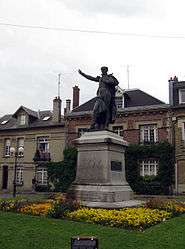Ham, Somme
| Ham | ||
|---|---|---|
|
Statue of General Foy | ||
| ||
 Ham | ||
|
Location within Hauts-de-France region  Ham | ||
| Coordinates: 49°44′50″N 3°04′25″E / 49.7472°N 3.0736°ECoordinates: 49°44′50″N 3°04′25″E / 49.7472°N 3.0736°E | ||
| Country | France | |
| Region | Hauts-de-France | |
| Department | Somme | |
| Arrondissement | Péronne | |
| Canton | Ham | |
| Intercommunality | Pays Hamois | |
| Government | ||
| • Mayor (2001–2008) | Marc Bonef | |
| Area1 | 9.5 km2 (3.7 sq mi) | |
| Population (2006)2 | 5,438 | |
| • Density | 570/km2 (1,500/sq mi) | |
| Time zone | CET (UTC+1) | |
| • Summer (DST) | CEST (UTC+2) | |
| INSEE/Postal code | 80410 / 80400 | |
| Elevation |
57–84 m (187–276 ft) (avg. 65 m or 213 ft) | |
|
1 French Land Register data, which excludes lakes, ponds, glaciers > 1 km² (0.386 sq mi or 247 acres) and river estuaries. 2 Population without double counting: residents of multiple communes (e.g., students and military personnel) only counted once. | ||
Ham is a commune in the Somme department in Hauts-de-France in northern France.
Geography
Ham is situated on the D930 and D937 crossroads, some 21 kilometres (13 mi) southwest of Saint-Quentin, in the far southeast of the department, near the border with the department of the Aisne. The nearby villages of Estouilly and Saint-Sulpice joined the commune of Ham in 1965 and 1966 respectively.
Population
| Year | 1851 | 1896 | 1954 | 1962 | 1968 | 1975 | 1982 | 1990 | 1999 | 2006 |
|---|---|---|---|---|---|---|---|---|---|---|
| Population | 2375 | 3254 | 3598 | 5279 | 5697 | 6074 | 6041 | 5532 | 5398 | 5438 |
| From the year 1962 on: No double counting—residents of multiple communes (e.g. students and military personnel) are counted only once. | ||||||||||
History
Mentioned for the first time in 932 as a possession of the seigneur Erard, junior member of the Counts of Ponthieu. The town was later conquered by the Counts of Vermandois in the 12th century. In the 14th century it was owned by a family from Ham itself. From April 7 to June 3, 1917, Ham was home to the Lafayette Escadrille
The Castle of Ham
.jpg)
The first stone ramparts were put up in the 13th century by the local nobleman, Odon IV.
In the 15th century, the château was transformed into a formidable fortress by John II of Luxembourg, Count of Ligny
In 1465, John's nephew, Louis of Luxembourg, built a huge donjon, 33m high, 33m in diameter with walls 11m thick[1]
In 1917, German forces blew up much of the château. All that remains are the entrance tower and vestiges of the donjon and ramparts.
Personalities
- Francis de Bourbon, Count of St. Pol, Duke of Estouteville was born at Ham in 1491
- General Maximilien Sebastien Foy was born at Ham in 1775
- Jacques Cassard, intrepid sailor, was imprisoned at the château of Ham from 1726 to 1740.
- Louis Napoleon Bonaparte, accused of plotting against the state, was imprisoned at the château of Ham from 1840 to 1846, when he escaped, disguised as a worker, carrying a plank on his shoulder.
- Léon Accambray, French politician
- Jean-Charles Peltier, physicist and meteorologist
- Jean-Baptiste-Henri du Trousset de Valincourt (1643–1730), biographer of Louis XIV
Twin towns
![]() Eisfeld, Germany
Eisfeld, Germany
See also
References
- ↑ Ham, its castle and its prisoners, Charles Gomart, 1864, réédition "La Vague Verte" en 2000.
External links
| Wikimedia Commons has media related to Ham. |
- Ham, Official municipal website
- Château of Ham
- Article and photos about the château of Ham
- Ham on the Quid website (French)

